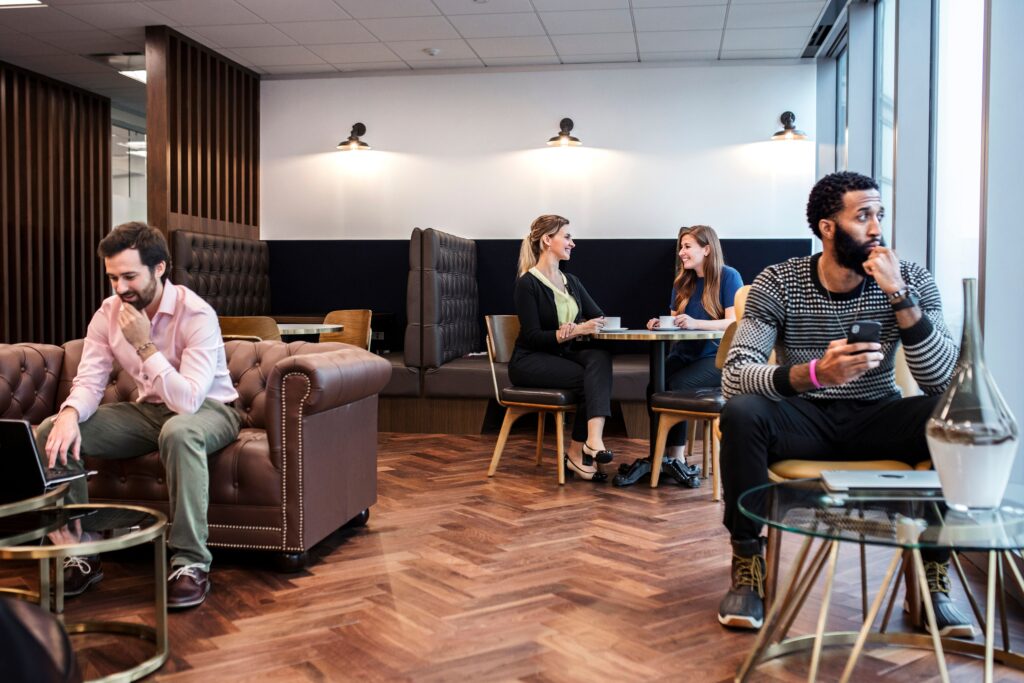More than 100 million startups launch globally every year. That’s hundreds of thousands of founders looking for workspace that’s fast to set up, affordable to maintain, and scalable without friction.
Coworking spaces meet those needs. They offer flexible terms, built-in infrastructure, and access to like-minded people, without the paperwork or cost of traditional office setups.
In global business hubs such as New York, London, Berlin, and Singapore, coworking spaces have become the standard for early-stage teams. They give startups the ability to focus on product, people, and growth, while someone else handles the Wi-Fi and other operational tasks.
This article explains the benefits of coworking spaces for startups and why they are so effective.
What Makes Coworking Startup-Friendly
Startups move quickly. They hire, pivot, raise capital, and sometimes scale across regions in a matter of months. Coworking spaces are designed to match that pace and support startups in their most malleable phase of the business life cycle.
Most provide ready-to-use desks, meeting rooms, high-speed internet, and communal zones. These furnished spaces have no setup time, come equipped with hardware, and eliminate the need to hire an office manager. For busy small business owners, this means less admin and more time on your hands.
Importantly, the space can expand or contract as the team grows. A startup collaboration might begin with one desk, add two more after funding, and transition into a private room a few months later. That level of operational elasticity is hard to find in traditional leases.
Coworking also brings people into proximity with other founders, developers, marketers, and mentors. For startups not yet plugged into an ecosystem, that matters more than it seems.
In global startup cities, these spaces are often located close to accelerators, VC firms, and universities. For early-stage teams looking to build quickly, test products, and connect with the right people, coworking is more than just a workspace.
It’s a multiplier. In fact, over 36% of startups globally now use coworking as their primary office setup – the traditional office space is no longer the only option.
Cost-Effectiveness & Flexibility
Startup owners don’t often have the luxury of time or budget to set up a traditional office. There’s the lease, the bond, the fit-out, and all the monthly bills that come with it. For most startups, that capital is better spent elsewhere, like hiring, building a product, or acquiring users.
Everything you need is already in place. Desks, Wi-Fi, meeting rooms, kitchen, admin support—it’s all there from day one. Instead of chasing vendors and waiting for install dates, you show up and work.
Many coworking spaces bundle essential services into one predictable cost. That includes utilities, cleaning, access to meeting rooms, and sometimes receptionist services. If something breaks, someone fixes it. You’re not managing an office, you’re using one.
Costs adjust as your team does. A founder might start on a day pass, then move to a dedicated desk. A team of four might use a private room for a few months. In cities like Berlin, Singapore, or Toronto, this still works out cheaper than commercial leases with five-year terms.
According to workspace data from Vuka, startups using coworking can reduce operational costs by as much as 30 to 40 percent, especially when you factor in infrastructure and support services.
For early teams, keeping overhead low buys time to build their business. Not every founder knows how fast they’ll grow, or how long they’ll need space. Coworking lets you move without pressure. Along the way, you’ll gain access to shared infrastructure, networking opportunities, and the chance to grow alongside others.
That kind of flexibility saves money and provides breathing room, making it one of the key benefits of coworking spaces for startups.
Professional Image and Infrastructure
Whether it’s meeting an investor, hiring your first team member, or presenting to a client, the environment you’re in says a lot.
According to Innovative Workspace data, 74% of coworking members report being more productive in a shared workspace compared to a traditional office.
Coworking spaces offer a workspace solution that looks and feels professional from day one. Most include furnished meeting rooms, reliable high-speed internet, phone booths, and shared access to equipment like printers or video conferencing tools. Many locations also have staffed reception areas, mail handling, and access control, which helps with privacy and logistics.
For startup owners, this removes the burden of setting up and managing physical infrastructure. You now have the liberty of running a business instead of upkeeping a bunch of private offices.
More importantly, the space supports real work. Design matters. Lighting, acoustics, and layout can affect energy and focus. When a coworking space balances this with shared breakout zones, the result is a more collaborative environment, the kind that supports discussion, learning, and momentum.
In startup-friendly districts worldwide, premium coworking hubs have positioned themselves not just as a place to work but as a foundation for growing businesses. Investors and partners recognise the difference between a home office Zoom call and a pitch delivered in a well-run space.
A well-managed coworking space for startups will bring you credibility.
Community, Networking and Innovation
Ask anyone who’s spent time in a coworking space, and they’ll tell you it’s beyond the office furniture or fancy fitness centers.
For a coworking startup, proximity to peers becomes part of the growth story.
When you sit near other builders, conversations occur that wouldn’t happen in isolation. You hear how someone raised their seed round. You learn about a tool you’ve never used. You get feedback without booking a call.
Coworking for startups opens the door to collisions of ideas and teams helping each other unblock. Professionals get honest answers from people who understand the same pressure. The early inventions of shared spaces were built by tech startups mingling in low-key events and lunch sessions – now we have a mix of casual and sophisticated networking opportunities.
And yes, it’s pretty standard! More than 70% of coworking members interact and network with others, and 64% make valuable professional connections. It may not guarantee traction, but it puts you in a room where momentum is already happening.
Accountability, Structure and Well-Being
Running a startup means working through constant change. Funding shifts, customer feedback rolls in, and hiring gaps appear. Through all of that, having a steady place to work can make a difference. Coworking brings that steady rhythm without feeling formal or out of step with how founders work.
There’s real value in showing up somewhere. Sitting at a desk, seeing familiar faces, and being surrounded by people who are building something helps reset your focus. That daily routine becomes a quiet anchor during unpredictable weeks.
Shared spaces also help create structure. They naturally build a separation between work hours and personal time. You take breaks when other people do. You start and end your day in a place designed for productivity. It’s a rhythm that helps reduce mental drag and keeps you moving with intention.
Coworking makes space for casual connections too. A quick chat over coffee, a nod from someone deep in their product sprint, these small moments add energy to your day. You’re in a room full of people who understand what it means to build, and that makes the work feel more grounded.
These everyday experiences are part of the benefits of coworking spaces for startups. They support focus, reduce isolation and create structure without forcing a rigid routine. For early teams navigating change, such an environment can be a real advantage.
Location and Market Access
Where you work shapes who you meet and who pays attention to you, making start-up coworking more than just cost savings. That holds true whether you’re backed by investors or building from scratch. Coworking spaces in commercial areas often sit close to client offices, partner networks and potential investors. In cities with active startup ecosystems like Singapore, this kind of positioning can open doors that wouldn’t exist from home.
Being nearby makes things easier. Meetings, pitch nights and community events are more accessible when they’re a few blocks away. In many places, coworking hubs serve as part of the local innovation network. The team next door might be building something similar or reviewing deals for a venture fund.
Some spaces are located near universities or startup accelerators on purpose. These areas offer steady access to talent, research and mentorship. Working from a location like this means startups can join conversations as they happen, not after they’re wrapped up.
Proximity also creates room for serendipity. A quick chat in the hallway can turn into a product intro or a warm lead. These aren’t scheduled outcomes, but they add texture to the workday and often lead somewhere valuable.
None of this guarantees growth. But it builds the kind of environment where small interactions lead to momentum, and over time, that momentum makes a difference.
Technology in Coworking Spaces
Ditch unreliable networks or vague security standards when you’re shipping features, closing deals, or managing sensitive data. Powerful tech in coworking is what gives startups an advantage, an equalizer.
Tech in coworking spaces sits at the core of what makes them work for startups. There’s no room for unreliable networks or vague security standards when you’re shipping features, closing deals, or managing sensitive data.
Most quality spaces are built with infrastructure that can keep up. Business-grade internet, network redundancy, and private VLANs are common. Some offer firewall controls, device authentication and 24/7 monitoring across access points. For teams working with regulated data or hosting their own tools, dedicated IPs or server space can also be part of the setup.
Many coworking hubs also provide access to well-equipped conference rooms. These spaces are used for team syncs, investor meetings, or client calls that need a more focused setting. It’s a detail that makes a difference, especially for startups that need polish without committing to long-term traditional office leases.
Support matters too. Onsite or on-call IT teams can step in when something breaks or needs configuring. That kind of help keeps momentum going, especially when teams are small and time is tight.
Across various industries, from fintech to healthcare to design, the technical layer beneath a workspace plays a bigger role than most people realise. Startups need a strong foundation so they can move quickly and stay focused.
It’s the quiet layer underneath the work.
Startup Office Spaces vs Traditional Spaces
Not all coworking spaces are built for the same kind of startup. A two-person founding team will need something different from a post-seed company with 12 staff. The right space should match your current operations without locking you into something you’ll grow out of in three months.
Here’s a quick comparison to help sort your options:
|
Workspace Type |
Best For |
Flexibility |
Infrastructure |
|---|---|---|---|
|
Coworking |
Early-stage, growing teams |
High |
Strong |
|
Traditional lease |
Established companies |
Low |
Build-your-own |
|
Incubator or hub |
Idea-stage or pre-revenue |
Moderate |
Mixed |
Before you commit, take advantage of free trials, day passes, or short-term plans. Many coworking apps also let you explore spaces in your city, book a tour, or compare services across providers. Walk in and book a tour, don’t just settle for what’s written on paper.
What should startup founders look for in a coworking space?
Startup founders should focus on flexibility, location, and infrastructure. Look for coworking space for startups that offers scalable plans, fast internet, private areas for meetings, and a strong community. The space should match how your team operates.
Is coworking worth it for small teams launching their first product?
Plenty of early-stage teams pick startup office spaces inside coworking environments. The setup is easier to manage, costs less upfront, and scales without the usual friction. You don’t have to think about utilities, furniture or long lease negotiations.
There’s also the people factor. Sharing space with other founders means you’re more likely to meet someone who can help move things forward. That could be a collaborator, a future hire or someone who’s already solved the problem you’re stuck on.
How is coworking different from startup incubators?
Incubators offer mentorship and funding in exchange for equity, often through structured programs. Coworking for startups is more flexible. It gives teams space, resources and community without tying them to someone else’s playbook.





